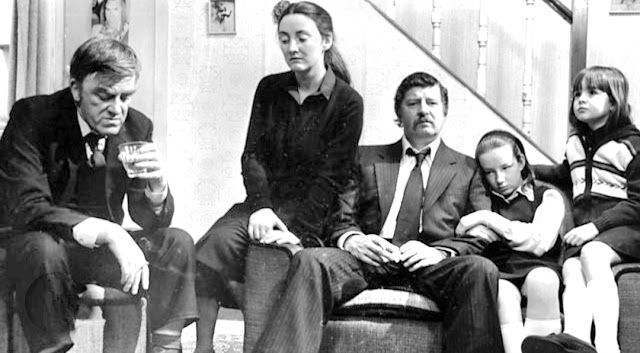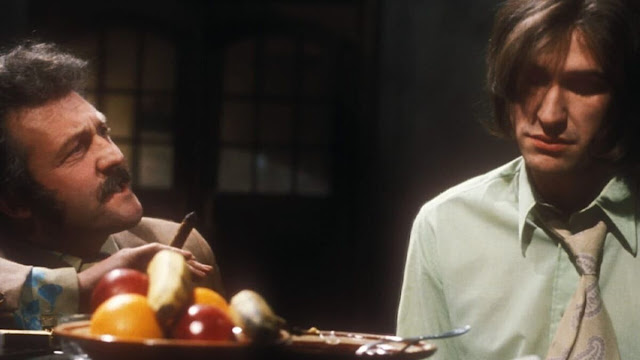Our Day Out, by Willy Russell - broadcast December 28th, 1977.
"Where are you going today?"
"By Christ, I bet she's kept busy! They're all bloody backward around here."
In an interview about the famous Billy plays that gave the young Kenneth Branagh his first television role, he talked about how good the children were who played his sisters. They weren't trained actors, but Branagh noted how they naturally inhabited their roles, utilising a child's innate gift for make believe. I felt that the cast of Our Day Out displayed the same ability to completely inhabit their roles. Of course, a cynic might point out that asking a gang of cheeky, Liverpudlian schoolchildren to play a gang of cheeky, Liverpudlian schoolchildren isn't the most demanding task, but they could have easily become wooden in the gaze of the camera. Their natural exuberance is what makes the play so fun to watch.
The head of the remedial class, Mrs Kay (Jean Haywood) is one of those rare teachers who seems to genuinely love the children in her care and her soft-hearted approach is viewed with contempt by her colleague Mr Briggs (Alun Armstrong), who decides that he is going to join the school trip. The clash between the two teachers and their diametrically opposed teaching methods becomes a pretty blunt metaphor for the wider clash between progressives and traditionalists.
I don't want to give any more details away about the plot, as beyond its light-hearted facade, Our Day Out makes some very serious points. Willy Russell clearly had something to say about the state of our education system - particularly the way it treated working class children - but he knew that we'd be more likely to listen if he could make us laugh first.
I wonder what happened to these young actors when they reached adulthood, as Liverpool's traditional industrial base collapsed and the unemployment rate reached 20% in 1985 - double the national average. It doesn't look as if any of them went on to take up acting as a career, so how did their brief brush with fame affect them?I enjoyed this play for many reasons. In addition to the strength of the writing and casting, I loved the voices. You could read an autopsy report in a Liverpool accent and it would sound witty. I also loved the anarchy of the schoolchildren, which brought back memories of my own school and the way we regularly terrorised the bus users of SW London with our Bash Street Kids antics. At a time when we are forever talking about a mental health crisis in our young, Our Day Out is a salutory reminder of what schoolchildren were like before computer games and social media.
Zoë:
For some reason, I kept putting off watching this play but, now I have seen it, I want everyone in the world to watch it, because it is such a joy. It tells the story of a remedial class's school outing from a very poor part of Liverpool to the seaside in Wales. At its heart is the conflict between the educational outlook of Mrs Kay, the remedial teacher leading the trip, and that of Mr Briggs, who, on being told by his headmaster that the trip is happening, decides to tag along to try to keep things vaguely orderly (earlier trips, it is hinted, have been fiascoes, with pupils running wild).
The viewer is, I imagine, supposed to take Mrs Kay's side in the central conflict of ideas. Her line is that the children in her care have no chance of ever bettering themselves as the educational system is deliberately designed to leave them so unenlightened that they will only be fit to be factory workers. Therefore her sole aim for the outing is that they have a very good time for one day. While the opening scenes - where we see old housing with corrugated iron in the windows and doorways instead of glass and actual doors - show us that the area the children come from is genuinely dreadfully deprived, the remedial teacher seems to have completely forgotten that, unlike now, there existed at the time that the play is set a network of grammar schools across Britain. These did provide a means of escape for many, many children who came from materially deprived homes.
Mr Briggs, by contrast with the remedial teacher, is a fierce disciplinarian, and, I suspect, meant by the playwright to come across as "uptight" and "uncool". Sadly, I don't recall him articulating an argument against the remedial teacher's point of view about the children's prospects, although he clearly doesn't agree with her methods. Instead of putting his case, he spends a lot of time shouting at the children and getting outraged. It is a great achievement on the part of Alun Armstrong, who plays the part of Mr Briggs, that he manages to make Mr Briggs come across as actually quite nice, even before the plot development late in the piece that allows us to see his cold heart warm as he comes round reluctantly to Mrs Kay's point of view.
Before that happens, the play manages to pack in an enormous amount of both comedy and poignance. The mainly young cast are superb, especially young Carol, who we meet right at the start, and Ronson, who seems to be the school idiot but turns out to be very thoughtful and touching. I haven't enjoyed watching anything on television as much as this for ages. My only quibble might be that the final scene where we see Mr Briggs's car coming along the street behind Carol as she walks home after school, looks, in this less innocent age where we are all encouraged into paranoia about pedophilia, a little ambiguous.







Comments
Post a Comment